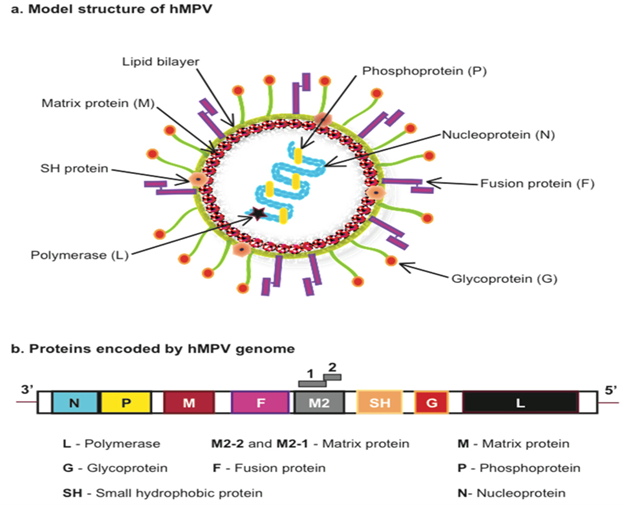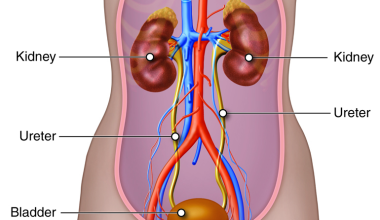Introduction: What is Human Metapneumovirus (Hmpv)?
A respiratory virus called human metapneumovirus (HMPV) mainly affects newborns, young children, elderly people, and people with compromised immune systems. It was first identified in 2001 and is known to cause respiratory tract infections similar to those caused by respiratory syncytial virus (RSV). HMPV belongs to the Paramyxoviridae family and is classified as a negative-sense, single-stranded RNA virus.
HMPV is highly contagious and spreads through respiratory droplets when an infected person coughs or sneezes. The virus primarily affects the upper and lower respiratory tract, leading to symptoms such as coughing, wheezing, nasal congestion, sore throat, fever, and in severe cases, pneumonia.
How Does Hmpv Spread and How Contagious is It Compared to Other Respiratory Viruses
- Primarily Spreads Through Respiratory Droplets : Human metapneumovirus (HMPV) primarily spreads through respiratory droplets when an infected person coughs, sneezes, talks, or even breathes. The virus can also spread by touching surfaces contaminated with the virus and then touching the mouth, nose, or eyes.
- Crowded Settings : HMPV is highly contagious, especially in crowded settings such as schools, daycare centers, and hospitals. Infants, young children, and individuals with weakened immune systems are particularly susceptible to HMPV infection.
- A Similar Level Of Contagiousness : Compared to other respiratory viruses like common cold coronaviruses or rhinoviruses, HMPV is believed to have a similar level of contagiousness. However, the exact degree of contagion can vary depending on factors such as viral load, individual immune response, and the effectiveness of infection control measures implemented.
Symptoms of Hmpv and When Should You Seek Medical Attention
Symptoms of Human metapneumovirus (HMPV) infection can vary from mild to severe, resembling other respiratory illnesses. Common symptoms include coughing, sneezing, nasal congestion, sore throat, fever, fatigue, and difficulty breathing. In some cases, HMPV can progress to more severe respiratory conditions like bronchiolitis or pneumonia, particularly in young children or individuals with weakened immune systems.
If you or a loved one encounters any of the following, seek medical help right away:
- Difficulty breathing or shortness of breath.
- Rapid or labored breathing.
- Persistent high fever.
- Bluish discoloration of the lips or face.
- Severe coughing or coughing up blood.
- Dehydration or inability to tolerate fluids.
- Signs of respiratory distress, such as chest pain or tightness.
Infants, young children, older adults, and those with underlying health conditions are more vulnerable to severe complications. It is advisable to consult a healthcare professional if you or someone in your care falls into these high-risk categories and displays symptoms of HMPV infection.
Tips on How to Keep Yourself and Your Family Safe From Hmpv
To keep yourself and your family safe from Human metapneumovirus (HMPV) and minimize the risk of infection, follow these tips:
- Practice Good Hand Hygiene : Wash your hands frequently with soap and water for at least 20 seconds, especially after being in public places or coming into contact with surfaces. Use hand sanitizer containing at least 60% alcohol if soap and water are not available.
- Avoid Close Contact : Limit close contact with individuals who are sick, especially if they have respiratory symptoms. Keep your distance from somebody who is sneezing or coughing.
- Cover Your Mouth And Nose : Use a tissue or your elbow to cover your mouth and nose while coughing or sneezing. Dispose of tissues properly and wash your hands immediately afterward.
- Clean And Disinfect Surfaces : Regularly clean and disinfect frequently-touched surfaces in your home, such as doorknobs, light switches, and countertops, using household disinfectants.
- Practice Respiratory Etiquette : Encourage family members to practice proper respiratory etiquette by coughing or sneezing into a tissue or their elbow, and immediately disposing of used tissues.
- Stay Home If You’re Unwell : If you or a family member is experiencing respiratory symptoms, such as coughing, sneezing, or fever, it’s advisable to stay home, rest, and avoid close contact with others to prevent the spread of HMPV.
- Boost Immune Health : Maintain a healthy lifestyle by getting regular exercise, eating a balanced diet, staying hydrated, and getting adequate sleep. A strong immune system can help reduce the severity of viral infections.
Also Read: The Future of Chronic Pain Management: How Science is Getting Closer to the Holy Grail
Conclusion
Human metapneumovirus (HMPV) is a respiratory virus that can significantly impact your health, particularly in vulnerable populations such as infants, young children, older adults, and individuals with weakened immune systems. It is highly contagious, spreading through respiratory droplets and close contact.








